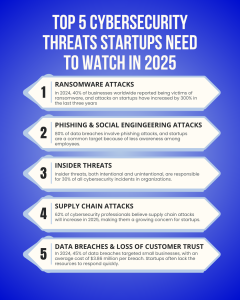Simplifying IT
for a complex world.
Platform partnerships
- AWS
- Google Cloud
- Microsoft
- Salesforce

In 2025, the cybersecurity landscape is more complex—and more dangerous—than ever before, especially for startups. With limited resources, smaller IT teams, and often weaker security postures, startups are frequent targets for cybercriminals. Understanding the top cybersecurity threats facing startups is essential to building a resilient, future-proof business.
This article outlines the five biggest cybersecurity risks for startups in 2025, based on industry data and projections. If you’re looking to strengthen your startup’s cybersecurity strategy, these are the threats you need to prioritize.
Ransomware remains one of the most damaging cyber threats. As of 2024, 40% of businesses worldwide reported being hit by ransomware, and attacks on startups have surged by 300% in the past three years. These attacks encrypt company data and demand payment for decryption—often with no guarantee of data recovery.
Startups are especially vulnerable due to less mature backup systems and lower cyber insurance coverage. In 2025, startups should invest in ransomware protection, including cloud backups, multi-factor authentication (MFA), and endpoint detection and response (EDR) tools.
According to cybersecurity studies, 80% of data breaches involve phishing attacks. Startups often lack formal cybersecurity training, making employees prime targets for phishing emails, fake login pages, and other social engineering tactics.
Cybercriminals use these methods to steal credentials, install malware, or gain access to sensitive business data. Mitigating this risk requires employee cybersecurity awareness training, email filtering systems, and strict access control policies to prevent internal compromise.
Insider threats, which include both malicious insiders and employees who unintentionally cause breaches, account for 30% of all cybersecurity incidents. At startups, where roles and access levels are often loosely defined, these risks can go undetected until it’s too late.
To prevent insider threats, startups should enforce least-privilege access, conduct regular audits of user activity, and use behavioral monitoring tools. Even honest mistakes—like sharing files on public links—can lead to catastrophic data exposure.
As startups increasingly rely on third-party vendors, cloud providers, and software platforms, supply chain attacks have emerged as a major cybersecurity concern. In fact, 62% of cybersecurity professionals predict an increase in supply chain attacks in 2025.
Startups should assess vendor risk, require third-party security compliance, and implement zero-trust architecture to limit external exposure. One compromised supplier can give hackers access to an entire ecosystem of businesses—including yours.
In 2024, 45% of data breaches targeted small businesses, with an average breach cost of $3.86 million. Beyond the financial impact, data breaches erode customer trust—often irreversibly. For startups that depend on early adopters and word-of-mouth marketing, this can be devastating.
Protecting sensitive customer and financial data requires strong encryption, compliance with data protection laws (like GDPR or CCPA), and a well-defined incident response plan. Building trust with users also means being transparent about how their data is handled and protected.
Startups may be lean, but they don’t have to be exposed. Understanding and addressing these cybersecurity threats for startups in 2025 can mean the difference between sustained growth and a devastating breach. Investing in the right tools, policies, and partner support now can help avoid costly fallout later.
Seashore IT provides cybersecurity services tailored for startups—ransomware prevention, threat monitoring, compliance consulting, and managed security solutions that scale with your growth. Don’t wait for an incident to take action.